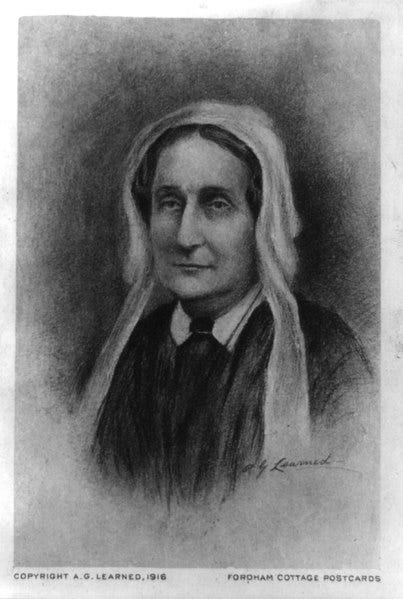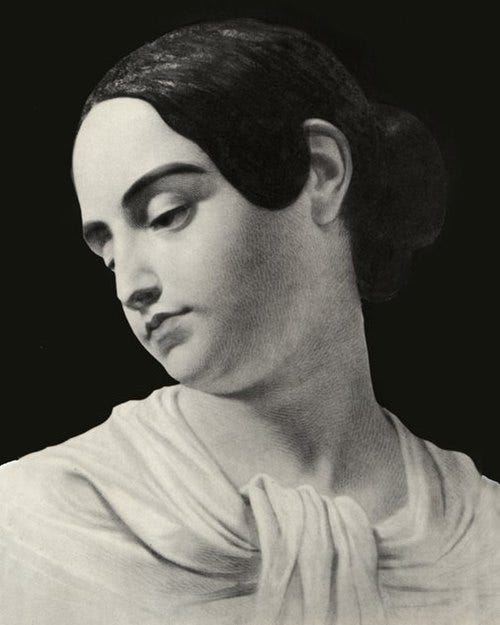This is the first part of a two-part article and is free to all readers. Part two will be published next week.

I’VE BEEN labouring under a misapprehension. When, as all minor writers must, I have felt discouraged by the leisurely progress of my career, and forgotten that to write is a joy, to be read a privilege, and to be paid for one’s work in an age of limitless free content nothing short of a miracle, I have been known to steady myself with the thought that the work of Edgar Allan Poe, that gloomy genius of American literature, went largely unappreciated during his lifetime. I reasoned that if a man of his brilliance struggled, it was hardly surprising that a writer of my meagre abilities should. I am pleased to have discovered that Poe was actually far more successful than I realised, although I am now left with the task of finding another writer to use as a spur.
My somewhat skewed impression of the American man of letters was of a morose alcoholic; a tortured soul riven with existential despair. I had somehow concluded that he must have gained only posthumous recognition. There’s no doubt that he was a troubled man who displayed a willingness, almost a compulsion, to contemplate the abyss and describe the darker recesses of the human psyche, but professionally speaking he enjoyed a fair degree of success during his lifetime, even if it was somewhat sporadic. Whilst poetry was his first love, it was by no means his sole literary pursuit; he was also a magazine editor and sometime proprietor delivering literature to the masses, an accomplished writer of prose, and a literary critic par excellence who was not above the occasional public scrap. To use a phrase that would have meant nothing to him, he was willing to think outside the box. With the publication of a poem called The Raven in 1845, he finally achieved international recognition, proof that despite his chequered history and a fair amount of misfortune, the scales did tip from time to time, allowing him to capitalise on his gifts, before a pitiful and mysterious death at the age of forty.
Edgar Poe was born in Boston, Massachusetts in 1809. His parents were actors, and his mother Elizabeth was blessed with a singing voice so lovely that she was nicknamed The Nightingale. Abandoned by her husband David who passed away in 1810, she had sole care of their three children, Henry, Edgar and Rosalie. Tragically, she died of tuberculosis in Richmond, Virginia in 1811.
Orphaned at the age of two, Edgar was separated from his siblings and taken in by a childless, well-to-do couple by the name of John and Frances Allan. Despite having had the advantage of being fostered by a wealthy merchant and his wife, the road ahead would be far from smooth. Never officially adopted by the Allans, he endured a tense relationship with his foster father, which was driven by disagreements about his chosen career. Conversely, he adored his foster mother Frances, who was gentle, supportive and nurturing.
Edgar was a keen athlete - a runner, a boxer and a swimmer - and was competitive by nature. Bright, quick-witted and rebellious, he became interested in poetry, especially the work of Lord Byron, and he began to see it as a way of establishing himself. He was encouraged to write by his best friend’s mother, a woman by the name of Jane Stanard, another female figure who made an impact on the impressionable youth. It is unsurprising that in the wake of the early loss of his mother and father he felt an insufficiency of parental affection throughout his life, and was driven by the pursuit of love, both familial and romantic. He expressed his feelings for Stanard in his work - the poem To Helen was written with her in mind - and when she died after suffering from a mental illness, he kept a vigil at her graveside. The following extract from To Helen clearly conveys the depth of his emotional attachment; he had placed this woman on a pedestal.
“On desperate seas long wont to roam,
Thy hyacinth hair, thy classic face,
Thy Naiad airs have brought me home
To the glory that was Greece
And the grandeur that was Rome.”
From a modern perspective it might appear that Poe’s life was blighted by tragedy to an unusual extent, but during the eighteen-twenties and thirties, the perils of childbirth, tuberculosis and other diseases ravaged the population of the United States, creating a culture of death. Mental illness must have been endemic as people struggled to cope with constant loss and mourning. It is small wonder that a significant part of Poe’s oeuvre, though by no means all of it, dealt with themes of horror, existential doubt and violence.
In 1826, after five years of education in England, Poe became a student at the University of Virginia, but for some reason John Allan refused to provide him with adequate financial support. He tried to raise money by gambling but instead got into debt, and was forced to abandon his studies and return home. He left the Allan house and moved to Boston, initially finding work with a newspaper, but after being ejected from his lodgings for failing to pay his rent he joined the army.
Initially, a military career seemed like a means of escape from his financial difficulties, but Poe soon discovered that he had an aptitude for army life. Additionally, while still stationed in Boston, he self-published a small volume of verse, Tamerlane and Other Poems (1827), however this period of relative stability would not last. After a lingering illness Frances Allan, his beloved foster mother, passed away.
It must have been a terrible blow. By the age of twenty Poe had lost three mothers, and now his only parental influence was the unsympathetic John Allan. Having attained the rank of sergeant major in the army, Poe tried with Allan’s help to get into West Point, the military academy, but he was unprepared for the levels of discipline expected there, and was expelled. After a failed attempt to get into the Polish army, he decided that he was done with both the military and with his foster father, and at age twenty-two he moved to Baltimore to live with his paternal aunt Maria Clemm, and her daughter Virginia. Having at last found the family he craved and a harmonious domestic life, he could begin to pursue his literary career in earnest.

In 1830s America, expanding cities and rising literacy rates produced a huge new market for reading matter. Although still a poet at heart, Poe began writing short stories, winning $50 in a fiction competition in 1833 at the age of twenty-four. When John Allan died in 1834 he left nothing at all to his foster son, preferring instead to leave his money to several illegitimate children, so it is hardly surprising that during his lifetime Poe avoided using the name Allan, preferring instead to be known as Edgar Poe or Edgar A Poe. Reliant on his own resources, he plunged into the burgeoning world of journalism as periodicals, magazines and journals sprang up to feed the increasing demand from the reading public.
In 1835 he was offered his first editorial job at the Southern Literary Messenger, a new periodical published in his home town. Leaving Maria and Virginia in Baltimore, he returned to Richmond to take up the position. It was around this time that he began writing his gothic tales, with the intention of reaching a wider audience. He was eager to write popular pieces that would sell, but at the same time he wanted to be considered a serious author. Keen to elevate American literature, he was also developing a reputation as an influencer of literary taste, producing responsible albeit hypercritical reviews of other people’s work, dissecting text in a kind of literary criticism that was hitherto unknown.
Poe’s energy and pragmatism seemed to be paying off - undoubtedly things were looking up for him professionally - but he was distressed to discover that back in Baltimore, Maria and Virginia had received an offer that threatened to break up his little family. It appeared that in order to preserve his new-found contentment he would need to act decisively, and the solution he had in mind would be deeply controversial.
Sources: Edgar Allan Poe: Buried Alive, PBS America 2017; Introduction to Edgar Allan Poe, Complete and Unabridged, Treasury of World Masterpieces (The Complete Tales of Mystery and Imagination, The Narrative of Arthur Gordon Pym, The Raven and Other Poems); Wikimedia Commons for access to images of the gravestones of Maria Clemm and Virginia Poe; eapoe.org; nevermorepoem.com; North Ayrshire Council naheritage.co.uk.





Your writing is brilliant Jules. My favorite of his is "The Dream."
I never knew he’d written a poem called ‘To Helen’, I’m going to look it up now. Great article, looking forward to the next one